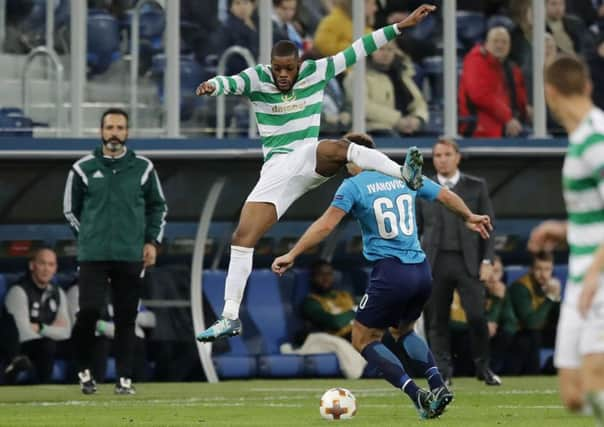Celtic facing harsh realities after European exit


The Scottish champions were comfortably too good for the part-time professionals of Linfield when they kicked off their campaign in the Champions League qualifiers last July, starting a journey which ended with Thursday’s emphatic Europa League elimination against Russian opponents with a budget of around £150 million.
The stopping-off points along the way saw Brendan Rodgers’ men find a way to overcome teams from Norway and Kazakhstan to fulfil their primary objective of reaching the lucrative Champions League group stage where they had to endure some chastening defeats against European superpowers Paris St Germain and Bayern Munich.
Advertisement
Hide AdAdvertisement
Hide AdSo having come to the end of the line in Europe for another season, Rodgers has little option but to accept the harsh truth of an environment where his aspirations of further progress for Celtic are bound by limitations which only seem set to become more restrictive.
“It’s very hard to say how far we are from where I’d like us to be in Europe,” said the Celtic manager as he absorbed the disappointment of his team’s pallid display in losing 3-0 to Zenit St Petersburg.
“It gets tougher each year. I suppose it’s about managing expectancy, really. If any Scottish team qualifies for the Champions League group stage, that’s a big achievement. Then you are going to then go in with teams like Bayern Munich who you saw winning 5-0 against Besiktas this week. We’re normally in a group with at least two teams of that real, real quality. So I think Champions League qualification in itself is a big achievement for a Scottish team.
“If you can then get into European football beyond that stage, ideally still in the Champions League or into the Europa League, you would hope you could make the steps forward we want.
“If you look at the games against Zenit, we were clearly much better than them in the first leg but our consistency wasn’t so good, so you end up going out.
“Year on year, you have to try to improve and we hope that if we can be in European football, we can do that. But there is always going to be the balance for us, we are always going to have young players in our team, that’s where we’re at really. It’s great to see them develop and flourish and we hope next year in Europe we can take more steps forward.
“It will get harder and harder [to compete with teams with bigger budgets] but we have to keep fighting. That is important for us. We’ve had a lot of great memories in Europe this season, because we have had great opportunities and in the main we take those opportunities.
“I felt Thursday night was another opportunity, on the back of how well we played in the first leg. But we have to keep creating those opportunities. We go away, we look at the games, we ask how can we improve, and each year it gets more difficult. Next year’s qualification for a Scottish team to get to the Champions League becomes even more difficult, with four qualifying rounds instead of three. But that’s the level we are at, so we just have to keep working.”
Advertisement
Hide AdAdvertisement
Hide AdRodgers was left dismayed by what he regarded as a lack of belief and courage among his players in St Petersburg. He revealed alarm bells were ringing in his head right from the opening moments of the match.
“It was interesting just watching our start to the game,” he said. “I like my team to have possession but I like dangerous possession. I felt we were going sideways and backwards too much, even when we had opportunities to turn. That is always a warning sign for me in terms of that belief.
“Zenit scored the first goal and that gives them the confidence and allows them to find stability in the game. For the rest of the half we never really affected the game. If you contrast back to the first leg when we could get the ball, we turned, we played forward, we got in between.
“When you don’t do that there’s always that fear. If you start passively in your defending, that makes it difficult for you. In the first leg, we had only conceded one shot on target. We were very stable and concentrated. Then you look at Thursday and I just felt from the start, for some reason, we were a little bit passive. That’s youth, it’s lack of experience in some key positions. So it’s just about coaching and it’s about time. It’s about players getting big experiences.
“It’s a disappointment, of course, but on reflection over the course of the European campaign there have been many good moments, many highlights for us, but of course many disappointments as well for us to improve on.
“Now we have a clear run domestically. From June of last year we have been virtually playing every other week. The squad has had injuries. The players have shown great fight right through until this stage, so now we have a clear run at it domestically and we will be looking to finish the season very strongly.”